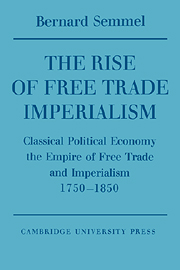 The Rise of Free Trade Imperialism
The Rise of Free Trade Imperialism Book contents
- Frontmatter
- Contents
- Preface
- 1 Introduction
- 2 Theory and politics of Free Trade Empire in the eighteenth century
- 3 The agrarian critique and the emergence of orthodoxy
- 4 The third school: Wakefield and the Radical economists
- 5 The Wakefield program for middle-class empire
- 6 Parliament, political economy, and the Workshop of the World
- 7 Cobdenism and the ‘dismal science’
- 8 Mercantilist revival
- 9 Classical political economy, the Empire of Free Trade, and imperialism
- Selected Bibliography
- Index
6 - Parliament, political economy, and the Workshop of the World
Published online by Cambridge University Press: 23 October 2009
- Frontmatter
- Contents
- Preface
- 1 Introduction
- 2 Theory and politics of Free Trade Empire in the eighteenth century
- 3 The agrarian critique and the emergence of orthodoxy
- 4 The third school: Wakefield and the Radical economists
- 5 The Wakefield program for middle-class empire
- 6 Parliament, political economy, and the Workshop of the World
- 7 Cobdenism and the ‘dismal science’
- 8 Mercantilist revival
- 9 Classical political economy, the Empire of Free Trade, and imperialism
- Selected Bibliography
- Index
Summary
That age of economical statesmanship which Lord Shelburne had predicted in 1787, when he demolished, in the House of Lords, Bishop Watson and the Balance of Trade, which Mr Pitt had comprehended, and for which he was preparing the nation when the French revolution diverted the public mind into a stronger and more turbulent current, was again impending, while the intervening history of the country had been prolific in events which had aggravated the necessity of investigating the sources of the wealth of nations. The time had arrived when parliamentary pre-eminence could no longer be achieved or maintained by gorgeous abstractions borrowed from Burke, or shallow systems purloined from De Lolme, adorned with Horatian points, or varied with Virgilian passages. It was to be an age of abstruse disquisition, that required a compact and sinewy intellect, nurtured in a class of learning not yet honoured in colleges, and which might arrive at conclusions conflicting with predominant prejudices.
Disraeli, ConingsbyThe mysteries of economical science are mysteries no longer; the recondite wisdom of the Smiths, Says, and Ricardos has become the diffused convictions, the common sense of society.
Philip Harwood, Lecture delivered at the London Mechanics Institution, Chancery Lane, 1843The science of political economy, as expounded by the most learned pundits of the day, is a very abstruse and arbitrary system. It partakes of the mysteriousness of theology and the glorious uncertainty of the law.
The Times, 19 March 1847In the last two decades of the eighteenth century, the Industrial Revolution had taken hold in Great Britain, as we have noted earlier, and Britain was well on its way toward becoming the world's first industrialized country.
- Type
- Chapter
- Information
- The Rise of Free Trade ImperialismClassical Political Economy the Empire of Free Trade and Imperialism 1750–1850, pp. 130 - 157Publisher: Cambridge University PressPrint publication year: 1970


